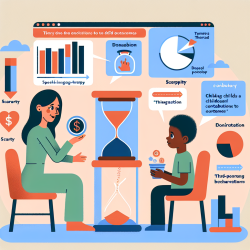Unlocking Potential: Insights into Hospitalization for Adolescents with Autism Spectrum Disorder
As a speech-language pathologist deeply committed to data-driven decisions, I am excited to share insights from a recent study titled "Characterizing the clinical and sociodemographic profiles of hospitalized adolescents with autism spectrum disorder." This research provides valuable information for practitioners working with adolescents with Autism Spectrum Disorder (ASD) and highlights the importance of specialized care in psychiatric settings.
Understanding the Study
The study, conducted by Avrahami et al., examined the demographics and clinical parameters of adolescent psychiatric inpatients with ASD compared to those without ASD. It further explored the differences between ASD patients with intellectual disabilities (ID) and those without. The findings reveal crucial information about the clinical presentations, risk factors for hospitalization, and the impact of psychiatric care on adolescents with ASD.
Key Findings
- The rate of males among participants with ASD was significantly higher than among those without ASD.
- Hospitalization duration was longer for ASD patients, yet they showed significant improvement upon discharge.
- Comorbid intellectual disability was present in one-third of ASD patients, with about 10% having comorbid epilepsy.
- Aggressive behavior was observed in about half of the ASD patients, yet the rate of cigarette smoking and major depressive disorder was lower compared to non-ASD peers.
Implications for Practitioners
These findings underscore the importance of tailored interventions and specialized care for adolescents with ASD. Practitioners can leverage this data to:
- Develop early intervention strategies targeting aggressive behaviors and mood disorders.
- Advocate for specialized psychiatric units that cater to the unique needs of ASD patients.
- Recognize the importance of addressing comorbidities, particularly intellectual disabilities, to improve clinical outcomes.
Encouraging Further Research
While the study provides valuable insights, it also highlights the need for further research, particularly long-term follow-up studies to assess the sustained impact of hospitalization on adolescents with ASD. Such research could inform policy-making and enhance clinical practices, ultimately leading to better outcomes for this vulnerable population.
To read the original research paper, please follow this link: Characterizing the clinical and sociodemographic profiles of hospitalized adolescents with autism spectrum disorder.










